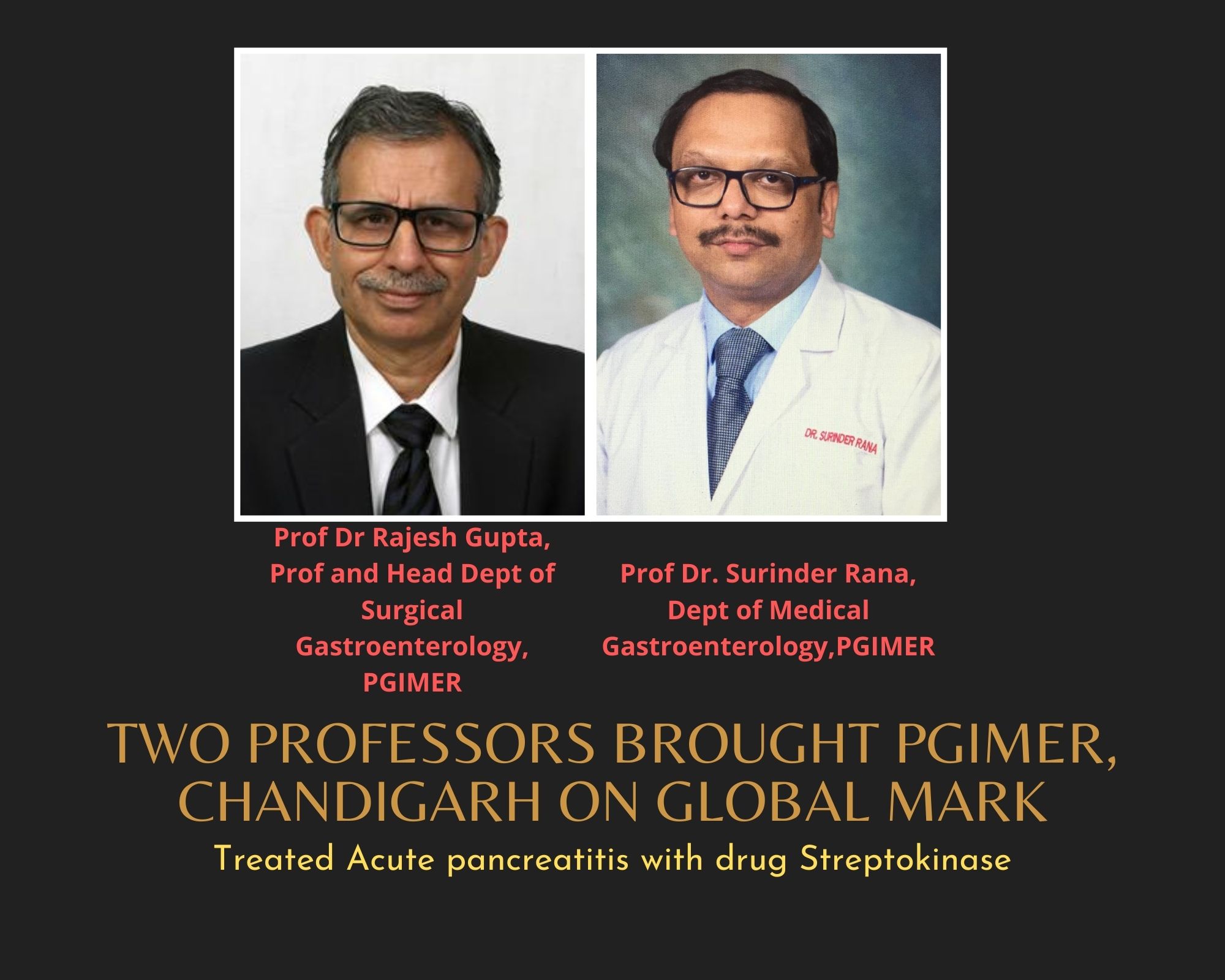Another ‘First’ added to the credits of PGIMER
As Surgical Gastroenterology’s ‘First Study in the World’ establishes the Role of Streptokinase in the Management of Severe Pancreatitis
First in World Severe Pancreatitis treated with Streptokinase drug. Adding another ‘First’ and this time ‘First in the World’ to the credits of PGIMER, the Department of Surgical Gastroenterology published a path-breaking study that has established the role of Streptokinase in the management of the dreaded disease of severe acute pancreatitis. PGIMER Chandigarh has so many path-breaking patient-friendly studies in its kitty, but this study and treatment are all about solace to those patients whose journey has always been the most painful one. Acute Pancreatitis patients are mostly unable to have food, as the pancreas, an organ that helps food to digest gets compromised in this condition for several reasons. Mostly, patients have acute thrombosis condition when they suffer acute pancreatitis and patient mostly has to go through surgery. This study would certainly help clinicians to treat patients with the help of this drug and could possibly avoid surgery.
Detailing about the Study, Dr, Rajesh Gupta, Professor & Head, Department of Surgical Gastroenterology, PGIMER stated, “Streptokinase has been used since the early 1960s for dissolution of intravascular thrombosis in Pulmonary thromboembolism, myocardial infarction, and deep vein thrombosis. The Department of Surgical Gastroenterology in close collaboration with the Department of Medical Gastroenterology started off-label use of Streptokinase in 2013. The idea to use Streptokinase in patients of severe acute pancreatitis was conceptualized after we observed its successful use in chest collections by Pulmonologists.”
Dr. Rajesh Gupta further elaborated, “We first conducted experimental work in 2013 to look at the effect of Streptokinase on pancreatic necrosis removed at the time of surgery and results were heartening. This encouraged us to use Streptokinase in two patients who were critical and not fit for surgery. We observed that addition of Streptokinase in irrigation fluid in the abdominal drain led to gradual improvement in their clinical condition and both the patients recovered without the need of surgery. We published this work in a top journal of pancreatic disease in 2014 namely Pancreatotology.”
“After this initial success, we planned the first study in 2015 and subsequently did three more studies including two M.Ch thesis in Surgical Gastroenterology in collaboration with Medical Gastroenterology and Radiology. We combined data from four studies and published results in one of the top Surgical Journals namely “Surgery”., added Dr. Rajesh Gupta.
Attributing the success to the commitment and perseverance of the team comprising of Prof Surinder Rana, Prof Mandeep Kang, Dr Ujjwal Gorsi, Prof Ritambra Nada and all the senior and junior residents involved in the study, Dr. Rajesh Gupta threw light on the results as he shared, “Results by our study have clearly shown that there was significant decrease in the need of surgery with use of streptokinase and there was no increase in complications with its use which was major apprehensions. Ours is the first large study involving more than 100 patients where streptokinase has been proven efficacious in management of severe pancreatitis with infected necrosis. We have observed that results of Streptokinase were better with higher doses.”
“The challenge for non surgical treatment for infected pancreatic necrosis is to effectively remove the infected solid necrotic material via the small caliber openings. Various approaches like aggressive irrigation with fluids or hydrogen peroxide has been previously used by us with varying results. A chemical lavage technique that effectively removes the solid material is need of the hour and use of streptokinase appears to be a step in that direction. The results of this study are very promising and this novel treatment approach needs to be explored by further studies”, exhorts Prof Surinder Rana, Department of Gastroenterology.
Dr. Rajesh Gupta further added, “We have recently completed another study where we have compared use of streptokinase with another agent i.e. hydrogen peroxide and found encouraging results with Streptokinase. This study is at present under consideration of another prominent journal. Now, we are planning a bigger study involving various Surgical and Medical Gastroenterology Departments in different parts of the country. This is the first time in the world that Streptokinase has been found to be a useful adjunct in the management of severe acute pancreatitis”.
“It is important to emphasize that the Department of Surgical Gastroenterology and Medical Gastroenterology are top departments in the country in the management of severe pancreatitis with a lot of research happening to reduce the complications and deaths in this dreaded disease,” concluded Dr. Rajesh Gupta.

